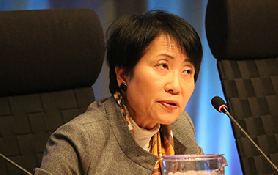The 49th meeting of the Global Environment Facility (GEF) Council approved a work program amounting to US$254.99 million.
The work program comprises 17 project concepts and two programmatic approaches, focusing mainly on climate change and sustainable ecosystem management in the Amazon.
In addition, GEF Chief Executive Officer (CEO) and Chairperson Naoko Ishii was appointed for a second four-year term.
 23 October 2015: The 49th meeting of the Global Environment Facility (GEF) Council approved a work program amounting to US$254.99 million. The work program comprises 17 project concepts and two programmatic approaches, focusing mainly on climate change and sustainable ecosystem management in the Amazon. In addition, GEF Chief Executive Officer (CEO) and Chairperson Naoko Ishii was appointed for a second four-year term.
23 October 2015: The 49th meeting of the Global Environment Facility (GEF) Council approved a work program amounting to US$254.99 million. The work program comprises 17 project concepts and two programmatic approaches, focusing mainly on climate change and sustainable ecosystem management in the Amazon. In addition, GEF Chief Executive Officer (CEO) and Chairperson Naoko Ishii was appointed for a second four-year term.
The 49th Council meeting brought together approximately 250 representatives from governments, international organizations and civil society organizations (CSOs), who gathered in Washington, DC, US, from 20-22 October 2015. The meeting was preceded by a CSO Consultation.
Council members participated in a panel discussion on the Amazon, and heard an update on preparations for the 21st session of the Conference of the Parties to the UNFCCC (COP 21) to be held in Paris, France, in November-December 2015. The Council also considered, inter alia: future directions on accreditation; impact evaluation of GEF support to Protected Areas and Protected Area Systems; knowledge management needs assessment; the Annual Monitoring Review; and an update on the preparation of Integrated Approach Pilots.
In her opening remarks, Ishii noted the limited number of projects being presented to the Council due to a lack of resources, and highlighted the GEF Secretariat’s reorganization, which will enhance integrated programming and GEF implementation. She pointed to the potential for the Non-Grant Instrument to mobilize funding for natural resource management.
Participants also discussed the Report of the Chairperson of the Scientific and Technical Advisory Panel (STAP), which highlighted, inter alia: assessments being undertaken on how best to measure resilience; clearly identifying and monitoring success/failure indicators; ongoing work related to black carbon, green chemistry and areas beyond national jurisdiction; that socioeconomic systems resilience underpins multiple Sustainable Development Goals (SDGs); the importance of knowledge management and open data for monitoring and evaluating outcomes and impacts of GEF projects; and the importance of aligning GEF indicators with SDG indicators.
On relations with the Conventions and other international institutions, Richard Kinley, UNFCCC Deputy Executive Secretary, said success in Paris would depend on the outcome on finance, noting consensus to include the GEF in the post-Paris financial mechanism. He urged increased funding for adaptation, particularly in the context of the Least Developed Countries Fund (LDCF) and the Special Climate Change Fund (SCCF). He recommended that the GEF, inter alia, support remaining countries in their efforts to submit intended nationally determined contributions (INDCs).
The 19th meeting of the Council for the LDCF and the SCCF convened on 22 October, adopting decisions on the progress report for the LDCF/SCCF and the work programme. Switzerland and Finland pledged US$2.6 million for the LDCF and US$2.3 million for the SCCF, on top of a US transfer of US$26.75 million received in September 2015 for the LDCF. On the LDCF/SCCF Progress Report, the Secretariat noted that demand for both LDCF and SCCF resources exceeds available funds, and explained that LDCF finances amount to US$17.78 million, while there is demand for US$254.48 million for GEF-endorsed projects and another US$72.02 million for submitted, but not yet endorsed projects.
The GEF Council meets twice a year, and is the organization’s main decision-making body responsible for developing, adopting and evaluating the GEF’s operational policies and programmes. It comprises 32 appointed Council members, each representing a constituency group of countries, most of which are composed of either donor or recipient countries. [GEF Press Release] [49th meeting of the GEF Council Website and Documents] [IISD RS Story on Opening of GEF Council Meeting, Discussion of Work Program and STAP Report] [IISD RS Story on GEF Council Approval of the Regional Programme to Protect the Amazon] [IISD RS Coverage of the 49th meeting of the GEF Council]